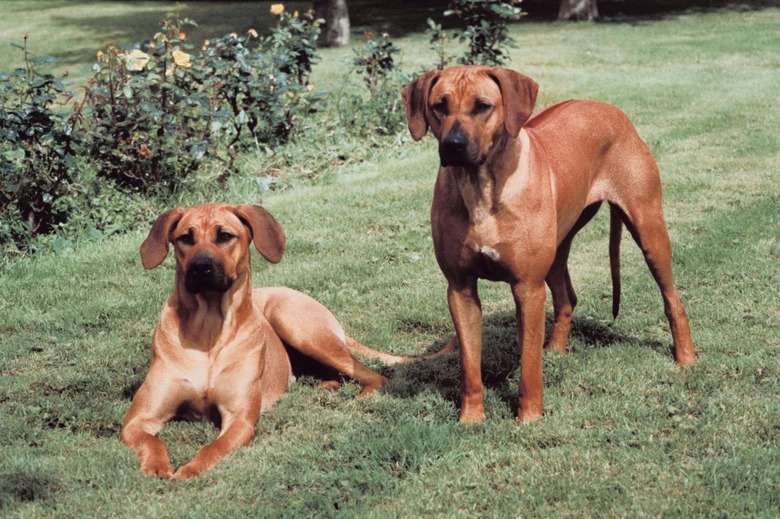Pros And Cons Of The Rhodesian Ridgeback
The Rhodesian ridgeback dog was developed in Africa to hunt big game. The breed's name describes the narrow ridge of hair that runs down the spine, growing in the opposite direction from the rest of the dog's coat. With the right care and training, a ridgeback can become a great companion. Before you bring one of these big, powerful dogs into your home, however, consider the pros and cons of owning a Rhodesian ridgeback.
Family Needs
Family Needs
The American Kennel Club states that these dogs become quite large at 70 to 85 pounds when mature. They are energetic and love rough play. Although usually good with children, their sheer size may make them dangerous around toddlers or the elderly, as they can knock them down. These energetic dogs make great companions for young adults and older children. Members of this breed want to be part of the family, curled next to you on the couch or at your feet. However, they are more aloof with strangers.
Protection Needs
Protection Needs
A Rhodesian ridgeback is independent with a strong prey drive, making him more difficult to train than some breeds. You must provide your ridgeback with a safe place to run and play in a fenced yard. This breed loves to dig and one dog can destroy your landscaping or garden. Any fence or barrier must be at least 6 feet high to prevent him from chasing any small animal that comes near. Once on the trail of a rabbit or the neighbor's cat, nothing will stop him, and he is in danger from traffic or from getting lost. If you cannot provide a large fenced yard, consider visiting a nearby dog park a few times a week for exercise. Although this breed prefers to be with you, if left outside, it needs shelter from excessive heat in summer or cold in winter.
Training
Training
Most Rhodesian ridgebacks do not bark excessively. This relative quiet is a real advantage in the city or with close neighbors. Your ridgeback will bark at intruders or strangers, alerting you to possible intruders. Ridgebacks are extremely intelligent and require even basic obedience training. With training, ridgebacks can become show dogs, obedience competitors, hunting partners or loving companions. Without the right training however, the ridgeback can be destructive and demanding.
Health Problems
Health Problems
It is important to obtain your Rhodesian ridgeback puppy from a reputable breeder who will not sell you a dog without divulging possible problems. The breed is susceptible to hip or elbow dysplasia, dermoid sinus and thyroid problems.
Care and Feeding
Care and Feeding
The Rhodesian ridgeback has short hair and only needs occasional brushing, shedding very little. This breed is always hungry and will eat anything, including furniture, tree branches and plants in your garden. Your ridgeback will clear your counters of any food left out. Feed him a healthy diet, on a schedule, to prevent overeating, stomach upsets and weight gain.
